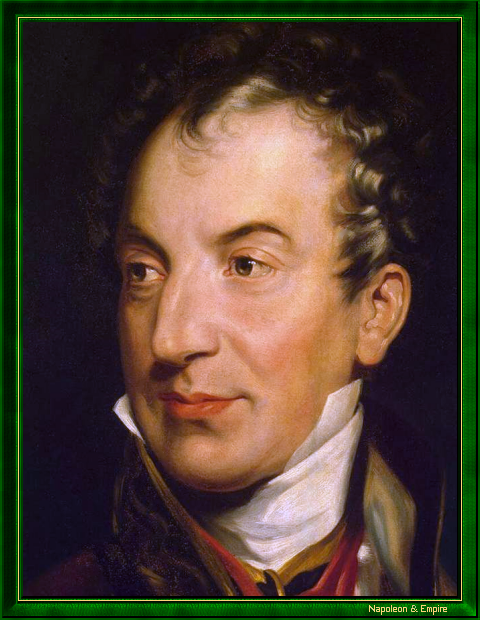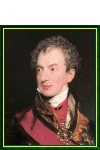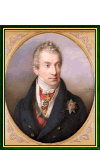Prince of Metternich

Klemens Wenzel Nepomuk Lothar Fürst von Metternich-Winneburg zu Beilstein was born on May 15, 1773 in Koblenz, into a noble Rhineland family. He began his law studies in Strasbourg in 1788, continued them in Mainz during the French Revolution, and abandoned them a few months after the coronation of Holy Roman Emperor Francis II (1792). He moved to Brussels, where his father had just been appointed Minister Plenipotentiary to the General Government of the Austrian Netherlands.
From the outset hostile to the Revolution, he applauded his country's entry into the war. In several pamphlets he wrote at the time, at least one of which was printed anonymously, he urged his compatriots to fight against these new barbarians, unfavorably compared to those of the 5th century. He went so far as to advocate a mass uprising, with the exception of the idle, the proletariat and those almost always ready to riot. But that's where his contribution to the war effort ended. The risks he saw civilization running did not prevent him from concentrating on his private affairs in the years that followed.
In September 1795, his father arranged a highly advantageous marriage for him with the granddaughter of Empress Maria Theresa's Grand Chancellor, Eleonore Kaunitz. Metternich settled in Vienna [Wien], where he led a quiet life, cultivating his taste for the arts and sciences and occasionally appearing at court.
In 1801, after the Peace of Lunéville, Klemens von Metternich decided to enter the diplomatic service, perhaps at the personal request of Emperor Francis II. Among several posts offered to him, he chose that of Minister Plenipotentiary in Saxony [Sachsen]. He then moved on to Berlin (1803) − where he urged Prussia to join the Third Coalition − and then, after Austerlitz, as he prepared to leave for St. Petersburg, was finally appointed ambassador to France, at Napoleon's own request.
He arrived in Paris on August 4, 1806, and met the Emperor for the first time at Saint-Cloud when he presented his credentials. For Metternich, Napoleon was the living embodiment of execrable revolutionary principles. His account of the meeting is a reflection of this: He was wearing the uniform of the infantry guard and had his hat on his head. This last circumstance [...] struck me as a misplaced pretentiousness smacking of parvenu; [...] His attitude seemed to me to announce embarrassment and even awkwardness. [...] His short, square figure, his careless bearing and yet his marked desire to make himself imposing, all served to weaken in me the feeling of grandeur that one naturally attached to the idea of the man who made the world tremble
.
Metternich stayed in Paris for three years. He became the lover of the Duchesse d'Abrantès, wife of General Jean Andoche Junot, as well as of Caroline Murat. He maintained good relations with Charles-Maurice de Talleyrand-Périgord, head of French diplomacy.
In his mind, the Treaty of Presbourg [Bratislava], signed shortly after the battle of Austerlitz, was no more than a truce. However, he felt that Napoleon was still capable of defeating the Austrian army in a matter of weeks. Austria must therefore be given time to strengthen and prepare its revenge. In the meantime, the best thing to do was to behave like an ally. All his reports advocated avoiding a break with France.
However, on April 8-9 1809, the Austrian government did break with France. Metternich was expelled from Paris on the 15th, but did not arrive in Vienna until after the city had fallen to the French. Napoleon took the pleasure of inviting him to Schoenbrunn , an invitation he politely declined.
Metternich was initially placed at the head of the Austrian delegation negotiating with the French, but was gradually removed for expressing a vision of Poland's future that displeased Napoleon.
This loss of influence was, however, only temporary. On October 8, he was appointed Foreign Minister and Chancellor of the Austrian Empire. One of his first acts was to sign the Peace of Vienna, the result of these negotiations.
Metternich then pursued a policy of temporization, waiting for the right moment to bring down Napoleon. Until then, he was determined to be the most accommodating of the allies.
The marriage of the Corsican parvenu to the Archduchess Marie-Louise, niece of Queen Marie-Antoinette, found Metternich one of its main architects. The event also gave him the opportunity to spend six months in Paris. There, he lived in close proximity to the imperial couple, with the Emperor treating him as a friend. A report written for Francis I in January 1811 summarized the lessons Metternich had learned from his stay: 1811 would see relative calm, but Napoleon would gather his allies during the year to prepare for the invasion of Russia, which would begin in the spring of 1812; Austria must therefore take advantage of 1811 to consolidate its finances and rebuild its army, before adopting an attitude of armed neutrality in 1812.
Even if the latter objective could not be achieved − Austria, as an ally of France, had to provide a contingent of 30,000 men for the Russian Campaign − this brilliant analysis would serve as the foundation for Viennese policy over the next two years.
In 1813, during the first months of the German campaign, Metternich pretended to mediate between the belligerents − France on one side, Russia and Prussia on the other. In fact, he was only waiting for the most favorable moment to join the alliance that the two latter had sealed at Teplitz Castle [Teplice]. On August 11, at the end of the Pleiswitz armistice that had interrupted hostilities from June to August, he proposed unacceptable peace terms to France, after which Austria declared war on its former ally.
The following year, he conceived the Quadruple Alliance and had it signed at Chaumont on March 9, 1814. After Napoleon's fall, he tried unsuccessfully to preserve the imperial throne for Marie-Louise and her son Napoleon II. He also failed to oppose the treaty giving Napoleon sovereignty over Elba. His agreement, reluctantly conceded, was accompanied by the remark: I will put my name at the bottom of a treaty which in less than two years will take us back to the battlefield
.
The Congress of Vienna, which reorganized post-Napoleonic Europe, was held under the presidency of Metternich. He rallied to the idea of a Holy Alliance proposed by Tsar Alexander I, despite his distrust of the Russian sovereign's mysticism, and imposed a conservative policy across the continent until 1830, with the aim of restoring the political and social regime that had existed prior to the Revolution.
The Greek insurrection − which Metternich refused to support − and the fall of Charles X marked the end of fifteen years of repression of all liberal movements (in Germany, Italy and Spain), and sounded the death knell for this system. The only place it remained was in Austria itself, where Metternich held on to power until a new revolution ousted him once and for all in March 1848.
After a rather inglorious escape, he found refuge in England, then, in 1849, in Brussels. He returned from exile in 1851 and kept out of public life until his death in Vienna on June 11, 1859.
"Klemens Lothar von Metternich" by Sir Thomas Lawrence (Bristol 1769 - London 1830).

A staunch conservative, Metternich confessed: The first moral element in me is immobility
.
Other portraits

Enlarge
"Klemens Lothar von Metternich" by Sir Thomas Lawrence (Bristol 1769 - London 1830).

Enlarge
"Klemens Lothar von Metternich". Miniature by Friedrich Johann Gottlieb Lieder (Potsdam 1780 - Budapest 1859).